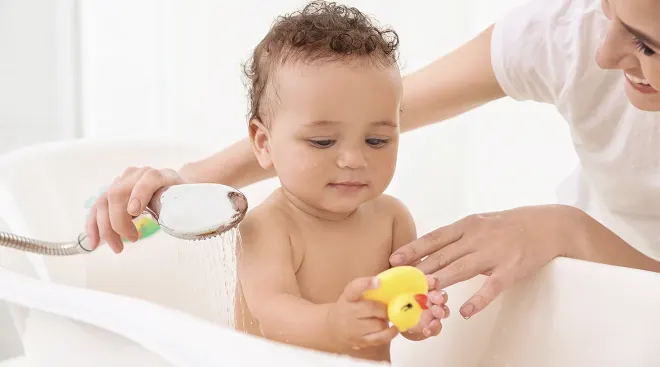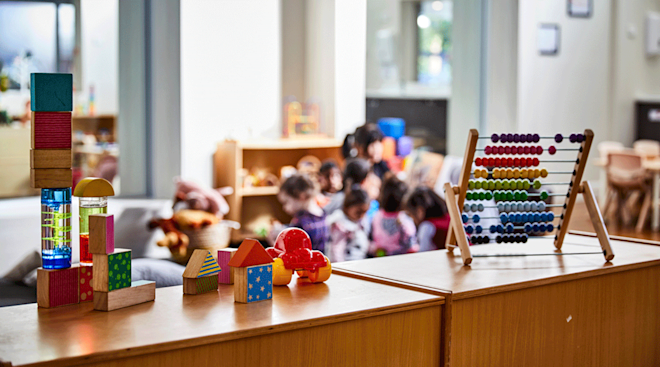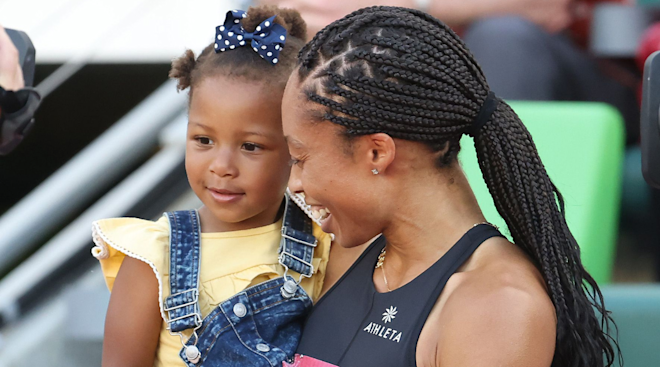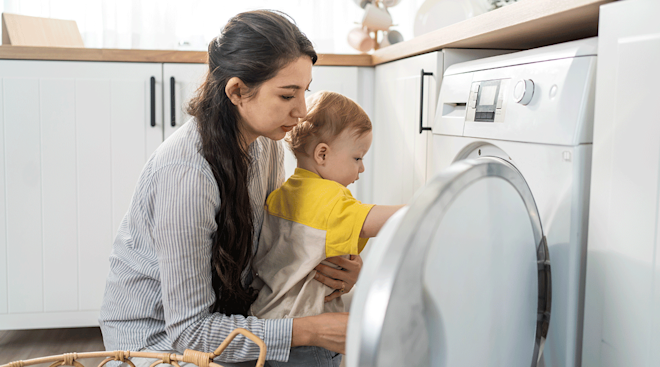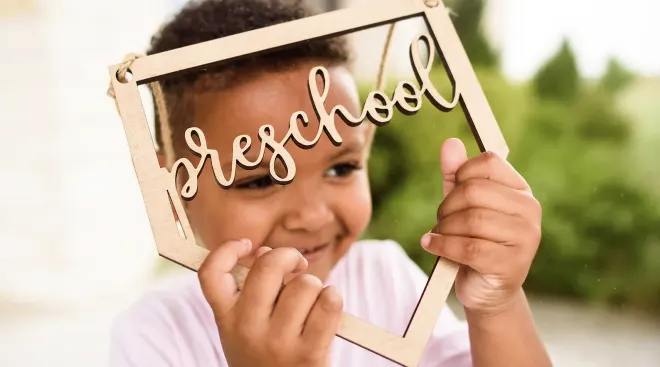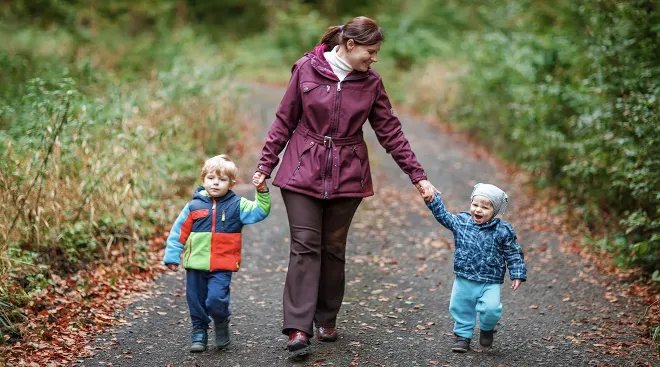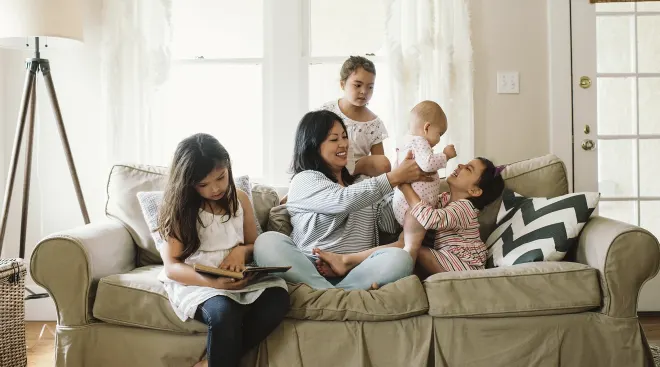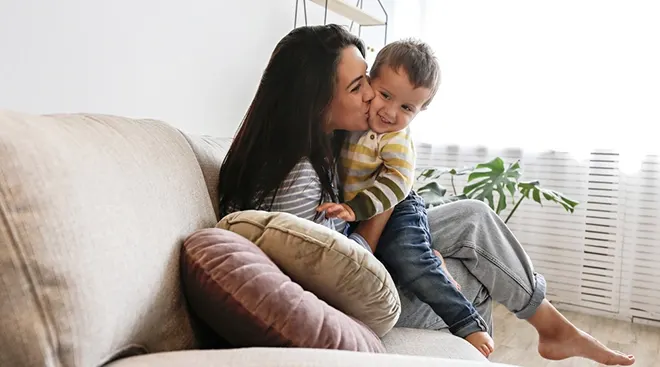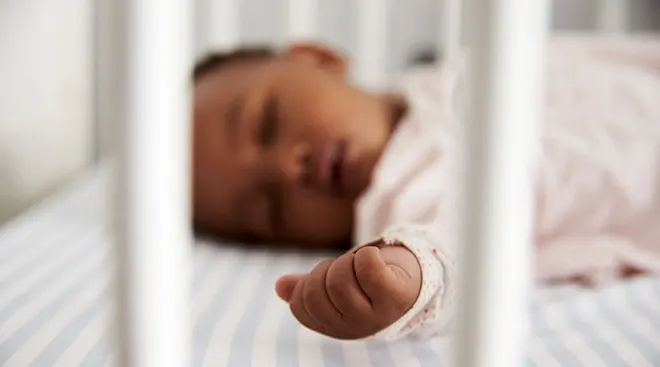How LGBTQ+ Families Can Find Inclusive Childcare
Finding childcare can be stressful for any parent. From cost to location to educational philosophy, there’s so much to consider when deciding whom to entrust with the care of your little one. For LGBTQ+ families, there’s an extra layer of thought that goes into the process. You want to ensure that your family feels safe and welcome in your chosen day care or preschool environment.
With no federal laws explicitly protecting LGBTQ+ individuals and families from discrimination—and only about half of all US states with such legislation—fear of prejudice is a real concern. According to a 2022 report from GLAAD (Gay and Lesbian Alliance Against Defamation), 70 percent of the LGBTQ+ community feels that discrimination has actually increased over the previous two years. Moreover, LGBTQ+ people of color are at even greater risk for experiencing prejudice based on, not only, their sexuality and/or gender identity but also their race or ethnicity.
Add on to that a new spat of anti-trans legislation, efforts to ban LGBTQ+ books in schools and libraries and state laws preventing discussion of sex and gender, and it feels more necessary than ever to thoroughly vet childcare options. LGBTQ+ families and allies alike need to do their homework and ask the important, sometimes uncomfortable questions when searching for inclusive options.
Here, experts, parents and advocates offer their hard-won advice on what to look for in an inclusive childcare setting and how to review the options.
An internet search for childcare in your area can be a great place to start, but it’s just that: a start. “One thing that most LGBTQ+ families do is ask other LGBTQ+ families,” says Aydian Dowling, trans activist, president and co-founder of Point of Pride and parent. “That inner community and word of mouth is definitely a good first step.”
Yan Dekel, host of Daddy Squared: The Gay Dads Podcast and parent of two, agrees. He’s found strangers and friends alike to be generous with sharing their honest childcare experiences, both good and not so good. “Facebook is a really good source for connecting in general with gay dads, but specifically about that,” he says. Local groups as well as ones for LGBTQ+ parents can be helpful sources of information.
For Rebecca Willman, chief community engagement and programs officer at Family Equality and parent of two, that personal feedback is key. “Having the ability to hear about folks’ first-hand experience and where day cares or childcare professionals are on the spectrum of accepting to affirming is really important,” she says.
When looking at websites of potential day cares or preschools, don’t skim over their diversity and inclusion policies. “If they don’t have written in a pretty obvious place that they have a non-discrimination policy, not saying something is saying something,” says equality advocate and parent of two Ash Beckham.
If you’re not looking for them, it’s possible to miss red flags within the policies. Dowling was interested in a school that had been recommended by progressive—albeit straight—friends. But upon closer examination, he found that, for older grades, their written policy was specifically not affirming of genderqueer of trans students. Needless to say, he didn’t send his child there, and his friends ended up pulling theirs.
Once you’ve narrowed down your list a bit, it’s time for the serious work to begin. When it comes to finding LGBTQ+ friendly childcare, it’s best to be direct. Dowling acknowledges that this can be risky depending on where you live, which is one of many reasons why an email to the director can be a good place to start. If you like the responses you get, you can move on to the in-person visit.
“What I and others have found is that actively inclusive day cares are likely to have responses at the ready, and they’ll get back to you by email,” says Willman. She looked for replies that clearly went beyond a generic or canned response; simply quoting the inclusion policy may demonstrate that, while they won’t discriminate, they also won’t necessarily be actively affirming.
“It’s going to be uncomfortable,” warns Beckham. “You’re going to have awkward conversations.” But, she says, open and honest communication about your concerns is crucial. And seeing how they respond can be a helpful litmus test.
Though it’s just one factor to consider, it can be super-helpful to ask about whether there are LGBTQ+ families and staff. Dowling has found that “if there’s a teacher that’s a part of the LGBTQ+ community, you can usually assume that they’re going to be more LGBTQ±friendly in general.”
That said, being the only queer family shouldn’t necessarily be a deterrent. It wasn’t for Beckham’s family. “We felt so comfortable with what they were doing, there were some queer and nonbinary staff members and things like that. I don’t think you need to have people that are necessarily like you to feel supported,” she says.
When you go for in-person visits of childcare programs, take note of whether they advertise their inclusivity. “What a little inclusive rainbow flag sticker can do,” comments Dowling. “It’s kind of dramatic to be honest.”
For Beckham, it was one of the signs, literally, that they were entering a safe and welcoming space. “They have the pink triangle with the non-discrimination policy on the doors when you walk in,” she says. “It’s overtly welcoming. There were these very visual cues that existed that were intentional.”
If you get a chance, pay attention to what books are available in the classroom. Seeing a variety of books on the shelves with diverse representations of race, ethnicity and family compositions is a good sign. “Especially depending on where you are, if you’re in a more rural area, the representation might only be in books, but that representation matters,” says Beckham.
Dowling also recommends asking about whether they have any restrictions on books and topics and whether they’d accept LGBTQ+ and other diverse books as donations.
Learning about what holidays a day care or preschool celebrates can be enlightening. If they acknowledge Pride month that’s obviously a green flag, but it’s important they approach all holidays with sensitivity. “I went into looking into schools a little bit horrified because I heard horror stories in the community from other dads about Mother’s Day,” recalls Dekel. He didn’t want his kids to go through that, and so he made a point of asking about it at each of the 20 preschools he visited.
The school that Dekel ended up selecting celebrates “Parents’ Day” instead of Mother’s Day, welcoming all caregivers. For their first Parents’ Day, Dekel’s family chose to honor their sons’ nanny, who had remained in touch and become family to them.
When searching for LGBTQ+ inclusive childcare, it’s worth examining all the ways in which they are inclusive. “I think it’s important to really honestly look at their diversity, not just relative to your diversity,” says Beckham. “Where do they stand and how active are they in diversity in the broad sense? We don’t want our kids to think their diversity is the only diversity.”
Ask about whether they conduct regular diversity and inclusion training for their staff. Beckham notes that it shouldn’t just be part of staff onboarding, but rather should be an ongoing and regular priority. Spaces that are welcoming in an intersectional way are likely to be more comfortable for LGBTQ+ families.
Besides a sensitivity to different family makeups, it’s also helpful to observe whether that same acceptance is extended to the children. Don’t be afraid to ask directly. Dowling suggests questions like, “Do you embrace different types of expression in clothing?” and “Do you allow kids to explore in their expression of play?”
In the preschool that Beckham chose, she observed that even kids were dressed however they liked. “It was like a freedom even in the kids’ self-expression that you could see on a daily basis. It was an enriching environment where kids were free to be exactly who they were.”
Willman saw this when she first visited her kids’ day care and has continued to assess as one of her children explores their gender identity. “It’s one thing for us to be queer parents, but when my kid is demonstrating his gender fluidity, it’s different and I get this protective mode,” she says. “But we have been continuously affirmed.”
No matter how warm and fuzzy the space, conflicts and tricky situations will arise. Whether it’s about biting, sharing toys or comments about another child’s family, kids are figuring out the world around them and rely on caring adults to guide them. It’s important to have trust in your child’s caregivers and their ability to navigate a range of issues. To that end, try forging strong connections with teachers and staff before any issues arise, rather than waiting until something comes up.
Although not always the case, many LGBTQ+ families have found that preschools that are connected with a community center of some sort tend to be a good fit. But even if they’re not formally affiliated with a center, how involved they are in the community can still be telling. How do they show up for different groups and causes? Do they host programming, participate in events or otherwise show support for marginalized communities?
Geography can play a big role in the number of inclusive options available, with certain states and areas being more progressive than others. But even in liberal enclaves, LGBTQ+ families find that they can’t assume every space will be a good fit. Plenty of places may check the right boxes on paper but then have only a surface level understanding of what it means to be truly inclusive. As Beckham says, “people can put a bow on it when they want you to be part of their community, but are they actually doing the work?”
While there are circumstances in which simply finding somewhere that doesn’t discriminate is a boon, if given the option, look for schools where they go the extra mile. As Willman found, “there can be a big difference between someone who says ‘we go to this day care, and we haven’t had any issues’ and someone who says ‘we go to this day care, and they actively talk about queer and trans families and various identities with children.’ That’s a very different experience that folks are having.”
Deciding on childcare can be deeply overwhelming, regardless of how many choices you have. So it’s important to check in with yourself. How do you feel in the space? How do you feel in the presence of the staff? Know when it feels right, and when to walk away. “If you make them nervous, if you’re sensing that unease… I would explore other options,” says Beckham.
Sometimes it’s a matter of cutting through the noise. “Take a breath and see how it feels in your gut,” advises Willman. “I think sometimes when we’re going in looking for affirmations or biases, we can get really caught up in the search. So take a few moments when you can to ask ‘what is my gut check here? How would I feel bringing my child here every day?’ I really encourage folks to trust your nervous system because it’s there, and it’s something that we’re all actively trying to find all the time.”
If you can’t find what you’re looking for, traditional day cares and preschools are not the only options. Nannies, nanny shares, childcare swaps and in-home day cares are just a few other possibilities. After finding that the preschools in her area didn’t even have space on their waitlists, Karen Skinner figured that a nanny was her only option, despite it being outside her budget. “I put out a call for a nanny on a local Facebook group saying we are queer, that BLM and trans rights are important, and got very few people responding. Other posts in this group had more people commenting but mine felt ignored because of what I said. I despaired that we wouldn’t ever find someone like minded to come into our home and look after [our son],” she recounts.
A trans friend taking a break from nursing ultimately stepped up and accepted the nanny position, for which Skinner is deeply grateful though it’s required dipping into savings to cover. She just found a LGBTQ+ affirming in-home day care where her son can start this summer. “She paints her son’s nails, everyone’s pronouns are respected…and it’s so much more affordable than a nanny.” It took time, but ultimately Skinner was able to find options that work for her family.
Being part of a LGBTQ+ family doesn’t mean that you’re required to take on the role of educator and advocate—that’s a lot of emotional labor. However, some families welcome the opportunity or see it as a responsibility.
“It’s kind of tough to be the first, but then you can really set the tone and be a resource,” says Beckham. “You’re as much a part of creating the community as anyone… You dig in and help do the work because you want to create a safe space for the next queer family.”
Cis families can and should chip in as well to make it the most welcoming, inclusive environment possible for every child. Even little things like donating diverse books to the school library, asking about diversity and inclusion training for staff, organizing Pride events or requesting that staff be mindful of pronouns can make a big difference.
Even once you find a childcare option that works for your family, the work doesn’t stop there. “I think it’s a continuing conversation,” says Beckham. “Our kids started when they were about five months old, and every time you get into a new classroom or you get new teachers, you’re doing an assessment.” Building relationships, keeping communication open and being as involved as possible are key.
In the end, the criteria that matters most will differ from family to family, and you need to make the choice that’s best for you and your child. Selecting a childcare provider is no small decision, so take your time and weigh your options carefully. “Allow yourself to be picky,” advises Dowling. “This is your kid. You’re going to show up, you’re going to be there, you’re going to be picking them up, you’re going to be talking to the administration. So just be picky and let yourself do the exploring that you need to do…Because this is also for you.”
About the experts:
Ash Beckham, known for her viral TEDx Talk Coming Out of Your Closet, the “accidental advocate” for equality doesn’t shy away from hard conversations. Her book Step Up: How to Live with Courage and Become an Everyday Leader is an empowering call-to-action to create change in our workplaces, schools, places of worship, communities and homes.
Yan Dekel is a community development consultant for non-profit organizations based in LA. He’s a dad of 7 year-old twins and the producer of Daddy Squared: The Gay Dads Podcast, which he co-hosts with his husband, Alex. Yan and Alex were seen on ABC’s The Parent Test.
Aydian Dowling is a transgender activist and influencer, motivational speaker and the president and co-founder of Point of Pride, a nonprofit, which has helped over 10,000 people receive gender-affirming garments and surgeries. Most recently, he launched the TRACE app for people in transition to better track their journey.
Rebecca Willman is the chief community engagement and programs officer at Family Equality, an organization that works to ensure that everyone has the freedom to find, form and sustain their families by advancing equality for the LGBTQ+ community. A former academic, she has published, taught and researched in the fields of reproductive health and freedom, gender and sexuality.
Plus, more from The Bump:
Navigate forward to interact with the calendar and select a date. Press the question mark key to get the keyboard shortcuts for changing dates.

































